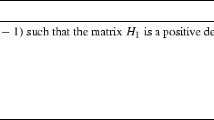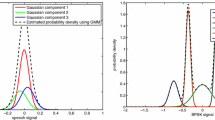Abstract
The one-bit-matching conjecture for independent component analysis (ICA) has been widely believed in the ICA community. Theoretically, it has been proved that under certain regular assumptions, the global maximum of a simplified objective function derived from the maximum likelihood or minimum mutual information criterion under the one-bit-matching condition corresponds to a feasible solution of the ICA problem, and also that all the local maxima of the objective function correspond to the feasible solutions of the ICA problem in the two-source square mixing setting. This paper further studies the one-bit-matching conjecture along this direction, and we prove that under the one-bit-matching condition there always exist many local maxima of the objective function that correspond to the stable feasible solutions of the ICA problem in the general case; moreover, in ceratin cases there also exist some local minima of the objective function that correspond to the stable feasible solutions of the ICA problem with mixed super- and sub-Gaussian sources.
Preview
Unable to display preview. Download preview PDF.
Similar content being viewed by others
References
Tong, L., Inouye, Y., Liu, R.: Waveform-preserving blind estimation of multiple independent sources. IEEE Trans. Signal Processing 41(7), 2461–2470 (1993)
Comon, P.: Independent component analysis–a new concept? Signal Processing 36, 287–314 (1994)
Delfosse, N., Loubaton, P.: Adaptive blind separation of independent sources: A deflation approach. Signal Processing 45, 59–83 (1995)
Bell, A., Sejnowski, T.: An information-maximization approach to blind separation and blind deconvolution. Neural Computation 7, 1129–1159 (1995)
Amari, S.I., Cichocki, A., Yang, H.: A new learning algorithm for blind separation of sources. Advances in Neural Information Processing Systems 8, 757–763 (1996)
Oja, E.: ICA learning rules: stationarity,stability, and sigmoids. In: Fyfe, C. (ed.) Proc. of Int. ICSC Workshop on Independence and Artificial Neural Networks, pp. 97–103 (1998)
Cardoso, J.F.: Infomax and maximum likelihood for source separation. IEEE Signal Processing Letters 4, 112–114 (1999)
Xu, L., Cheung, C.C., Yang, H., Amari, S.I.: Independent component analysis by the information-theoretic approach with mixture of density. In: Proc. 1997 IEEE Int. Joint Conf. Neural Networks, III, pp. 1821–1826 (1997)
Xu, L., Cheung, C.C., Amari, S.I.: Learned parametric mixture based ICA algorithm. Neurocomputing 22, 69–80 (1998)
Xu, L., Cheung, C.C., Amari, S.I.: Furthere results on nonlinearity and separation capability of a liner mixture ICA method and learned LPM. In: Fyfe, C. (ed.) Proc. I&ANN 1998, pp. 39–45 (1998)
Girolami, M.: An alternative perspective on adaptive independent component analysis algorithms. Neural Computation 10, 2103–2114 (1998)
Everson, R., Roberts, S.: Independent component analysis: A flexible nonlinearity and decorrelating manifold approach. Neural Computation 11, 1957–1983 (1999)
Welling, M., Weber, M.: A constrained EM algorithm for independent component analysis. Neural Computation 13, 677–689 (2001)
Gao, D., Ma, J., Cheng, Q.: An alternative switching criterion for independent component analysis (ICA). Neurocomputing 68, 267–272 (2005)
Cheung, C.C., Xu, L.: Some global and local convergence analysis on the information-theoretic independent component analysis approach. Neurocomputing 30, 79–102 (2000)
Liu, Z.Y., Chiu, K.C., Xu, L.: One-bit-matching conjecture for independent component analysis. Neural Computation 16, 383–399 (2004)
Ma, J., Liu, Z., Xu, L.: A further result on the ICA one-bit-matching conjecture. Neural Computation 17, 331–334 (2005)
Himmelblau, D.M.: Applied Nonlinear Programming. McGraw-Hill Book Company, New York (1972)
Edelman, A., Arias, T.A., Smith, S.T.: The geometry of algorithms with orthogonality constraints. SIAM J. Matrix Anal. Appl. 20, 303–353 (1998)
Author information
Authors and Affiliations
Editor information
Editors and Affiliations
Rights and permissions
Copyright information
© 2006 Springer-Verlag Berlin Heidelberg
About this paper
Cite this paper
Ma, J., Chen, Z., Amari, Si. (2006). Analysis of Feasible Solutions of the ICA Problem Under the One-Bit-Matching Condition. In: Rosca, J., Erdogmus, D., Príncipe, J.C., Haykin, S. (eds) Independent Component Analysis and Blind Signal Separation. ICA 2006. Lecture Notes in Computer Science, vol 3889. Springer, Berlin, Heidelberg. https://doi.org/10.1007/11679363_104
Download citation
DOI: https://doi.org/10.1007/11679363_104
Publisher Name: Springer, Berlin, Heidelberg
Print ISBN: 978-3-540-32630-4
Online ISBN: 978-3-540-32631-1
eBook Packages: Computer ScienceComputer Science (R0)




